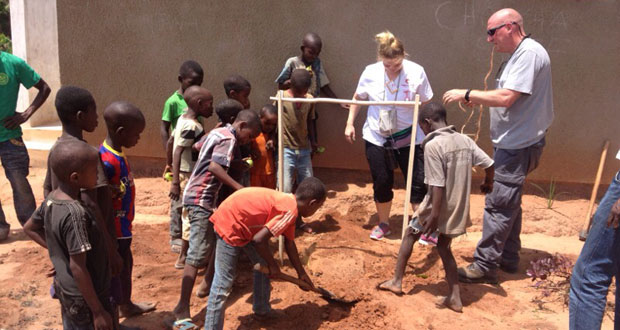A partnership spanning two continents is seeking to transform healthcare in one of Africa’s most populated cities.
Known as the Global Health Alliance Western Australia (GHAWA), the partnership is underpinned by a program that, to date, has delivered professional development education to more than 1850 local health workers, primarily nurses and midwives, in the Tanzanian capital, Dar es Salaam.

Global Health Alliance Western Australia program Lead Jenni Ng at the Pwani Region rural health post, with children from the Masanganya community in Tanzania.
Jenni Ng (GHAWA project lead)
Health workers from Tanzania’s Muhimbili National Hospital, Muhimbili Orthopaedic Institute, Amana, Temeke, Mwananyamala, Kairuki, and Kisarawe Hospitals – including two rural primary health centres at Masaki and Masanganya – have already accessed the program and continue to do so in 2016.
Short courses on maternal and child health, emergency and acute care, and infection prevention are all delivered on site and provided at no charge to staff. The UN is reporting a 45 per cent decrease in maternal death rates since 1990; programs such as GHAWA’s are making the right impact where it’s needed most.
We have staff who travel to Tanzania to volunteer for up to a month at a time, and the reciprocal experiences and knowledge gained is invaluable. For many of our students and healthcare professionals, the opportunity to work abroad promotes a greater appreciation and experience of working in what can sometimes be a challenging environment.
Qualities such as cultural understanding, leadership and creating practical solutions in the field are developed or realised from within. For example, in more developed countries, we often rely on technology to help us deliver the best healthcare we can. However, being placed in a situation without this luxury, where initiative and adaptability is required, brings our core nursing qualities to the fore.

Local nursing staff in Dar es Salaam receive certificates for completing a two-week course, with Pam Bell, Jessica Waugh and Daniel Ballinger.
Nicole Beer (University of Notre Dame student nurse): I traveled to Tanzania in November 2015 and my experience in Tanzania was like no other. It changed the way I think about global healthcare and it gave me a new appreciation for what we have in Australia.
The situations we faced required quick thinking with limited resources. Words can’t describe how much of a privilege it was to go and meet such humble people.
Although strategic health education programs are the core platform of GHAWA’s focus, opportunities have arisen to allow GHAWA to expand its assistance and deliver support in a variety of other ways.
This includes working with mining resource companies and villages on corporate social responsibility, providing clean water in villages, and the donation of medical supplies and equipment.
While Tanzania is the primary focus for GHAWA, interest in partnerships is building from health agencies and governments in Zambia, Malawi, Zimbabwe, Sri Lanka.

Nurse educators Daniel Ballinger, Pam Bell and Jessica Waugh delivering education on acute care nursing in Tanzania with local staff, in a narrow corridor without power.
Jenni Ng: The challenge will always be the ability to fund new partnerships; and there is always more to be done. However, GHAWA was created as an alliance program to give us a vehicle to allow additional funding to be obtained from other NGOs.
Given the success of the program, it won’t be long before we see it established in other countries across the globe.
Do you have an idea for a story?Email [email protected]
 Aged Care Insite Australia's number one aged care news source
Aged Care Insite Australia's number one aged care news source


